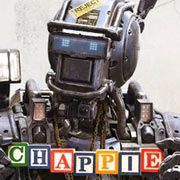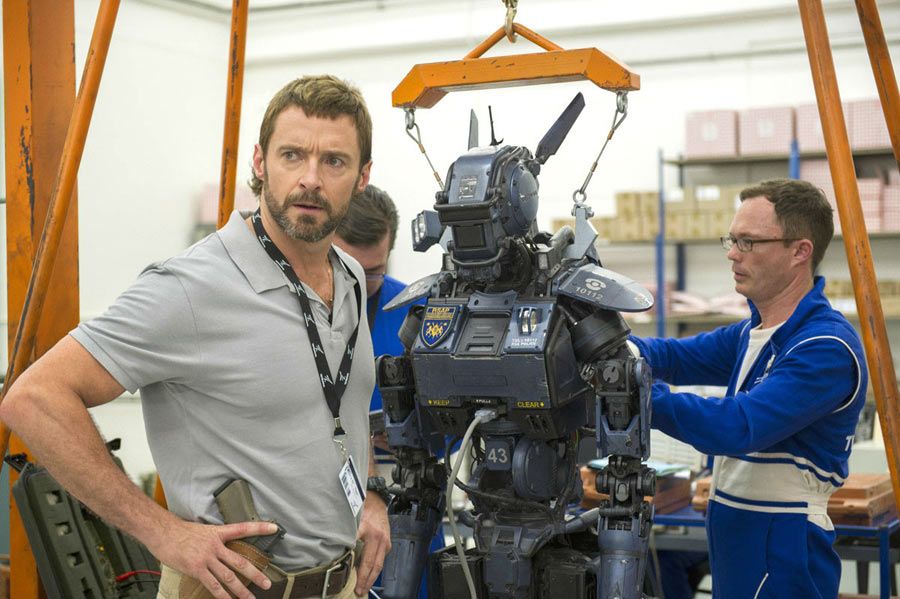If Neill Blomkamp's "Chappie" succeeds at anything, it's supplanting "Elysium" as the filmmaker's biggest failure.
With a story built on the backs of unlikable characters -- and driven less by believable motivations and more by whatever's convenient for the plot -- "Chappie's" script is an undercooked, Frankensteinian mash-up of "RoboCop" and the "Los Locos Kick Your Ass" segment from "Short Circuit 2," padded with obvious thematic aims that never resonate outside of making one wish they were watching something else.
From minute one, the film appears eager to prove how broken it is, opening "District 9"-like with two talking heads presented in documentary style. Both speak in restrained awe about the unprecedented impact the police robot Chappie has had on the world, one the movie then flashes back 18 months prior to share. The film ends without ever circling back to those talking heads, which is a narrative basic that the director got right in his first feature. That's how wrong and lazy the direction is here; Blomkamp doesn't even correctly rip off from himself.
As for the impact this robot has on the world -- it boils down to a sentient A.I., who talks like a South African Vanilla Ice, learning (without any earned narrative context) how to upload human consciousness like photos in the cloud, after spending most of the movie carjacking and attacking humans with ninja stars.
All of which plays out much worse than it reads.
In a future roughly two years from now, according to news crawls, Johannesburg is, for some reason, the proving ground for an experimental police force comprised of mechs called "Scouts" -- skinny, human-shaped robots that are insanely resistant to all kinds of artillery, which is good, as their human counterparts mostly use them as riot shields whenever they enter hot zones.
The Scouts are the product of a local corporation and their genius inventor, Deon Wilson (Dev Patel) -- a guy so valuable to the company that he is relegated to a cubicle directly in front of his inventor rival, Vincent (a wasted Hugh Jackman). Vincent has made an obvious ED-209 knock-off, "The Moose," which rests on blocks as its cluster-bomb armaments are deemed a bit much (after millions have already been spent, mind you) for urban pacification. Bitter and upset at Deon's success, Vincent sets out to ruin the Scout program just as Deon makes a world-changing breakthrough: The ability to make his A.I. sentient.
After CEO Sigourney Weaver denies Deon a chance to Beta test the sentience program on a Scout heading for the scrap pile -- without ever once exhibiting awe at the fact that robotic sentience is now a thing that this company can now patent and profit from -- Deon steals the Scout to test on his own. Only to get carjacked by annoying street thugs, played by the rap group Die Antwoord.
They soon take to teaching Chappie how to act like a criminal, using him in a convoluted heist plot in an attempt pay off a local crime lord they have wronged. All of this goes down as Chappie unrealistically learns the value of human life after going out of his way to attack, shoot and slam into a ceiling some of the very humans he supposedly cares about.
Blomkamp's story is full of confused and ill-conceived choices, the biggest of which is casting Die Antwoord as the film's leads. They have two speeds: annoying and uninteresting. The movie lacks the self-awareness of its titular character in regard to how much hatred these characters actively court, making it all the more difficult to watch when the serious music and slow-mo camera shots kick in to underscore their respective fates that we care nothing about. In fact, you end up rooting for one of their deaths because it means you don't have to hear that person's irritating voice anymore.
"Chappie" is full of moments where characters feel deeply about other characters for whom you feel nothing, between scenes that seem to actively defy emotionally honest storytelling. By the time Chappie completes his emotional journey, you've spent the majority of your time watching him do so by way of punching cars, wearing bling and freaking out in increasingly grating ways. He starts life with the personality of a baby, behaving like a scared puppy, and denied a vocabulary for some reason by his "Master." He does nothing to endear himself to the audience, especially after bonding with his parental-like characters whom we first meet on the run from the police after shooting some of the officers in the head.
Weaver's character, meanwhile, is the worst CEO ever; when she's not announcing via the high school-like P.A. system the company's successes, she presides over a place where it is acceptable to carry a sidearm to your desk and press to the head of your colleague in front of an entire office. This company, much to the plot's convenience, has seemingly no physical or digital security measures in place, making it insanely easy for people to break in and out of it (No wonder Sony released it -- hiyo!)
While Weaver and Jackman give career-low performances, looking lost for most of the run time, it's writer-director Blomkamp who comes away the worst. His world-building primarily serves impressive CG and concept art. Not one moment rings true with anything resembling heart or pathos, but the CG is next-level photorealistic. If only the story was given the same attention to detail.


